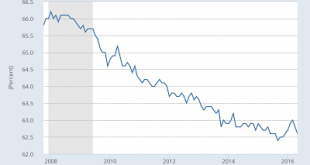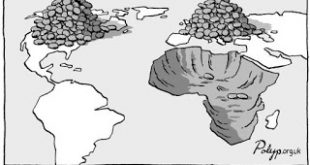Argeo Quiñones-Pérez and Ian Seda-Irizarry discuss the crisis in this piece. They correctly point out the neocolonialist solution being imposed by the US administration. I find the imposition of a Fiscal Control Board (FCB) particularly problematic. Back when Argentina defaulted in 2002, Rudi Dornbusch had suggested something similar. At that time I sent the letter below to the Financial Times that had published his proposal. LETTERS TO THE EDITOR: Mystery of about-turn on Argentina ...
Read More »On the jobs numbers at the Rick Smith Show
[embedded content]
Read More »Weak jobs report should kill interest rate hike
Or so it seems. The BLS last employment situation summary says that only 38000 jobs were created last month. Unemployment fell to 4.7%, but that is mostly the result of the fall in the participation rate, that is, less people in the labor force (see below). In other words, unemployment rate is lower not because unemployment decreased (at least not much), but because workers stopped looking for jobs. Since the crisis there has been no recovery in the labor force participation rate, as shown...
Read More »Overdose of heterodoxy, failed Keynesian policies or same old balance of payments constraint?
The hunger games Ricardo Hausmann blames the situation in Venezuela to excessive heterodox policies. The piece is not particularly well written, but if you look for the deep cause of the crisis, according to Hausmann, then you must conclude that it is a fiscal one. The government spent too much, and got into too much debt. In his words: Governments often struggle to balance their books, leading to over-indebtedness and financial trouble. Yet fiscal prudence is one of the most frequently...
Read More »Is there a new “new economics”?
INET has posted a piece by Eric Beinhocker on what he calls the “new economics” [sic]. That used to be Keynesian economics, back in the 1960s. Now it’s a mesh of New Institutionalism, Behavioral Economics, and Complexity Analysis. He argues that: “New economics does not accept the orthodox theory that has dominated economics for the past several decades that humans are perfectly rational, markets are perfectly efficient, institutions are optimally designed and economies are self-correcting...
Read More »Revised GDP and the slow recovery
BEA released the second estimate of the first quarter GDP, and it's up from 0.5 to 0.8%. Not bad, not great. Note that federal government spending is a drag on the recovery (although local and state governments are positive force, and part of that is actually funded by the federal government anyway; so the actual negative impact of contractionary fiscal policy is smaller than what the numbers suggest). At any rate, this will be used to demand higher rates in the next meeting of the FOMC. You...
Read More »A brief note on Venezuela and the turn to the right in Latin America
So besides the coup in Brazil (which was all but confirmed by the last revelations, if you had any doubts), and the electoral victory of Macri in Argentina, the situation in Venezuela is reaching a critical situation, and it would not be surprising if the Maduro administration is recalled, even though right now the referendum is not scheduled yet.The economy in Venezuela has collapsed (GDP has fallen by about 14% or so in the last two years), inflation has accelerated (to three digit levels;...
Read More »Who is afraid of Neoliberalism? A comment on Mirowski
Way less scary than Neoliberalism Debate with Mirowski, as promised. From the INET website: While the Neoliberal movement’s concerns extend into a broad political reorganization of society, it remains intimately connected with neoclassical economic thought. The idea of a Neoliberal Thought Collective (NTC) being a “completely different school of thought” from neoclassical economics is not quite correct. It is true that Neoliberalism transcends the more limited scope of neoclassical...
Read More »Latin American Corner: Thoughts on inflation targeting
By Naked Keynes (Guest Blogger) Several Latin American economies (Brazil, Chile, Colombia, Mexico, Peru) adopted full-fledged inflation targeting regimes at the end of the 1990s and beginning of the 2000s. Others are following suit including the Costa Rica, Dominican Republic, Guatemala, Paraguay and more recently Argentina.Inflation targeting is defined by its proponents as a monetary policy framework, rather than iron clad rule as monetary targeting, consisting in the public announcement...
Read More »DisORIENT: Money, Technological Development and the Rise of the West
A very short paper on a very broad subject, co-written with David Fields, which was presented at the last ASSA Meetings in San Francisco. It is forthcoming in the Review of Radical Political Economics (RRPE). The title is derived from Gunder Frank's ReORIENT, that David and I always thought was thought provoking, but surprisingly Monetarist in its assumptions about money. The paper also adds a discussion of Pomeranz famous views on the Great Divergence, particularly the views regarding...
Read More » Naked Keynesianism
Naked Keynesianism





